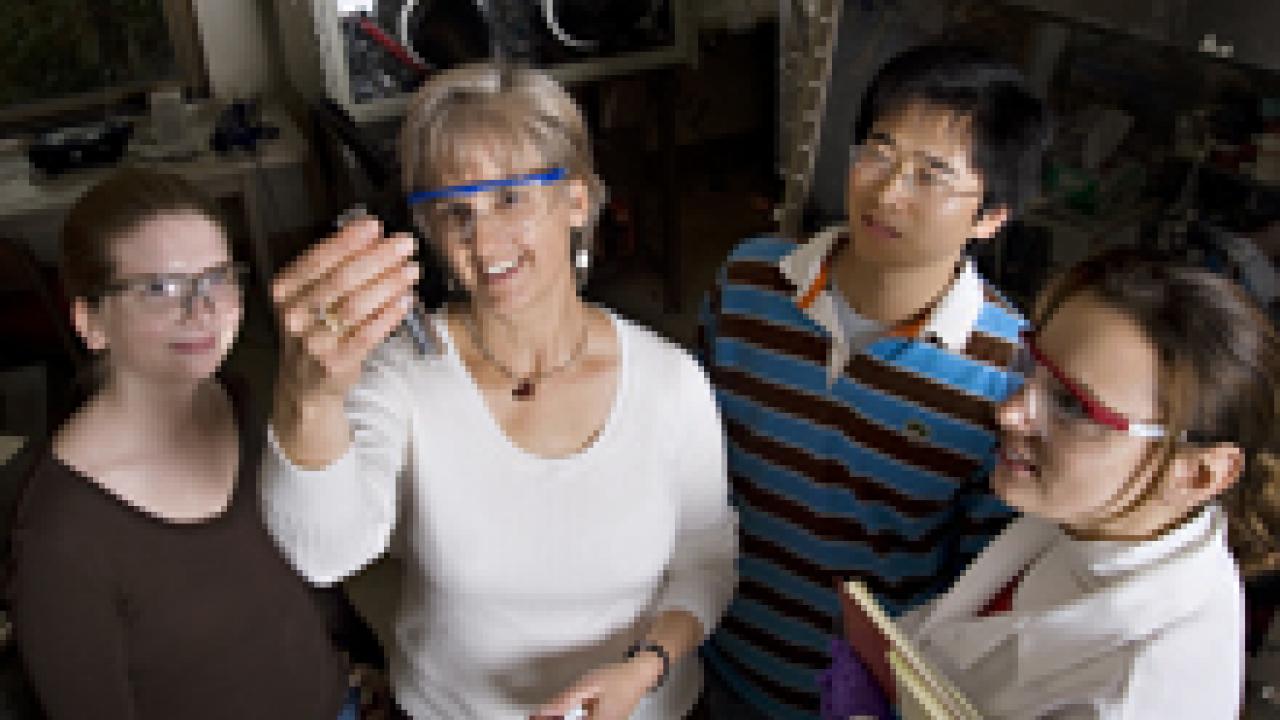Susan Kauzlarich, professor of chemistry, received Jan. 6 a 2009 Presidential Award for Excellence in Science, Mathematics and Engineering Mentoring, along with a $10,000 grant to fund her mentoring work.
Kauzlarich was among 18 professors and three scientific educational organizations from around the country to receive the awards, which were presented in a White House ceremony.
The annual award, administered by the National Science Foundation, recognizes a commitment to mentoring and improving the participation of minorities, women and disabled students in science, mathematics and engineering. It comes with a grant from the NSF to fund recipients’ mentoring proposals.
Giving back to the community
Kauzlarich arrived at UC Davis in 1987 after receiving a Ph.D. in chemistry from Michigan State University and serving a two-year stint as a postdoctoral associate at Iowa State University. From the outset, she felt the appointment carried a moral imperative.
“If you become faculty at a university, to really make a difference you should try to give back to the community,” she said.
She determined early on that one of her contributions could be the academic support of disadvantaged and minority high school and college students, a decision based on an episode from her undergraduate years.
As a female student working toward a 1980 bachelor of science degree in chemistry, Kauzlarich herself had been a minority, she said. Her original goal was to become a high school teacher, until a chance comment opened her mind to bigger possibilities.
“As part of a sociology class, I had interviewed a bunch of teachers at the high school,” she recounted. “Then out of the blue, one of them said, ‘Why do you want to teach high school? Why don’t you teach college?’”
Until that moment, she had never considered the possibility. But when she later broached the subject with her undergraduate adviser, he agreed that it was a good idea. Kauzlarich now realizes that the adviser may have been assuming this was her plan all along. “When you’re in the dominant culture, you think everyone is thinking just like you,” she said.
Kauzlarich soon joined forces at UC Davis with another fledgling faculty member, Peter Schiffman, then an assistant professor of geology. Together they launched a program sponsored by the American Chemical Society called SEED, or Summer Educational Experience for the Economically Disadvantaged.
SEED has run continuously on the Davis campus since 1988, with Kauzlarich serving as the program’s director until 2004 and as one of its mentors for minority and women high school students for every one of its 22 years.
SEED brings high-achieving students from disadvantaged economic backgrounds to a college campus to do hands-on research.
“These are students who are probably not thinking about college, so this summer experience can be the start of the pipeline for them. Our big goal is to help students understand the scientific process and become excited by science,” Kauzlarich said.
The program has been successful thanks to the dedication of faculty volunteers, Kauzlarich said. Three other faculty members in the chemistry department have played key roles: Carlito Lebrilla and Don Land made major contributions as directors until 2005, and since then the program has been directed by Ting Guo.
Pushing students to achieve their highest potential
Kauzlarich has been active in every mentoring program for women or minorities in science on the UC Davis campus, including MURALS (Mentorships for Undergraduate Researchers in Agriculture, Letters, and Science), MURPPS (Minority Undergraduate Research Program in Physical Sciences) and AGEP (Alliance for Graduate Education and the Professoriate).
An internationally recognized researcher in solid-state and materials chemistry, Kauzlarich provides a rich scientific environment for students. She has graduated 25 Ph.D. students and four master’s degree students and has advised 13 postdoctoral fellows, many of them women and minorities. She has put 50 undergraduates and a couple of dozen high school students to work in her lab over the years.
Her efforts have won praise from colleagues, administrators and legions of former students, who combined forces to support her application for the presidential mentoring award.
“I’ve interacted with around 100 faculty mentors on the Davis campus and Susan Kauzlarich is the best I’ve ever seen,” said Richard Scalettar, a UC Davis physics professor.
He noted, “She has an exceptional ability to push her students to achieve their highest potential,” Scalettar said, “while at the same time providing a supportive and nurturing environment for them.”
Media Resources
Clifton B. Parker, Dateline, (530) 752-1932, cparker@ucdavis.edu
